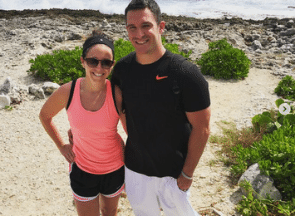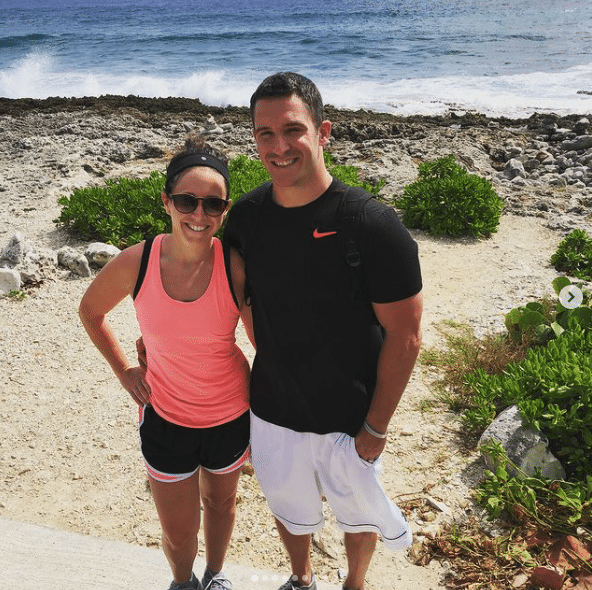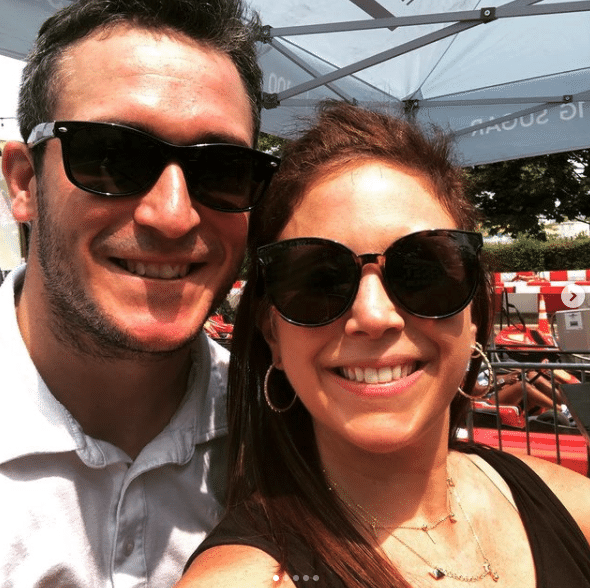Choosing You – Why I Chose to Walk Away from IVF

IVF can put an immense pressure on you, mentally, emotionally and physically. Before deciding that IVF or any other procedures are right for you and your journey, it is a good idea to make sure you are in the right mind set for it. You are the most important part of this process, without you there wouldn’t even be a process. Learning to put yourself first is the most important thing to do before starting IVF. Learning how to recognise when your body or mind is being over-worked is an invaluable ability that Kelly Clancy learned much later on into her IVF journey. Kelly has kindly chosen to share her ongoing journey to motherhood with our The Ribbon Box readers with the hope that she will inspire other intended parents (IPs) to put themselves first when trying to conceive.
Read on to find out what was the catalyst for Kelly’s breakthrough to prioritise herself and how she handled any guilt that arose when she decided to give up IVF.
Words by Kelly Clancy
If you are reading this article, then you or someone you know is struggling with infertility. We all hope that our journey to motherhood is one that will be easy, light and “fun”. But for many, including myself, that is not the case. My journey to motherhood is one that I am still very much on and one that has been both unexpected and incredibly taxing on both myself and my husband. But in a world where infertility is meant to be a taboo topic, I’m here to try and change that narrative and to remind you that your struggles — whether past or present — do not define who you are.

I experienced heartbreak from almost five years of trying naturally plus undergoing every infertility treatment under the sun and I’ve come to recently learn that my body is simply not meant to carry a child. But while that is my background, that is not what I want to focus on today. I want to focus on how these struggles helped to build the person that I am today — how I slowly built (and continue to build each day) resilience in the face of adversity. This is not in any way meant to say I’m perfect. God knows I’m far from it and even sometimes in my lowest of lows I question how much more can one really take? But my goal today is to remind you that no matter what you’re going through, no matter what curveballs come your way, you ARE and you WILL be okay.
We all face struggles in life – whether it’s difficult relationships with your family or loved ones, an illness you or a family member are fighting, insecurities about yourself, financial struggles — you name it. Each one of us reading this article is fighting some sort of secret battle.
As the world’s biggest Taylor Swift fan, I find that this quote resonates with me and my infertility journey: “Fatefully, I tried to pick my battles until the battle picked me”. And boy, did that battle pick me. I feel like when you think about it, most of life’s battles are often unanticipated. They hit you on a Tuesday afternoon at 3:15 PM when you least expect it; if you’re anything like me, those unexpected moments don’t hit you very well. What can I say, I like to plan ahead — I like colour coordinated calendars and ‘to do’ lists, I like knowing what lies ahead and how to plan for it. So, it should come as no surprise that when it was time to bring a baby into our life, I had a plan.
After two years of marriage, I decided it was time for us to shift from a family of two to a family of three. Just like that, as if I could magically make it happen. Like everything else in my life, I planned it down to a T. We would begin on January 1st, we would track everything on an app and boom, the pregnancy test would show a positive a few short weeks later. “We’ll be pregnant at the same time”, I naively exclaimed to my best friend who was pregnant at the time.
A few short weeks later, when my period came, I cried on the couch questioning, “What did we do wrong?” When my husband told me this process could take years, I thought angrily, “Years?! Not us”. That’s the thing about life’s hard parts — we never think it will never happen to us until it does.
In September of 2018, I knew in my heart that something was not right. While others may have felt defeated or worried about having to go see a fertility specialist, I was oddly excited. He was the “best” fertility specialist out there and he would fix me. A term I later learned to never, ever use again.
When I started IVF, I was relieved to finally find an answer to my sleepless nights; relieved to (falsely) believe that I was in control again. If I followed the list of instructions and went to my appointments regularly, I would have our baby. It became my religion — everyday that I wasn’t going through IVF was another day without our child. I had developed a sense of comfort in that if I was doing IVF, then I was doing everything I could to make our family a party of three.
In two years, I had undergone eight rounds of IVF, a major surgery, two egg retrievals, two implants, an ERA biopsy, many cancelled cycles, a miscarriage followed by a D&C and three hysteroscopies. You would think that the writing was on the wall that maybe this process just wasn’t meant for me but that wasn’t the case. Occasionally, I would find myself teetering between wondering when enough is enough, followed by a lingering sense of guilt that I could not “quit” on our baby. Each round came with higher doses, longer needles, more medications, and each time I showed up, more eager than the last ready to fight another round, regardless of the effects that IVF was having on my body.
I lived with blinders on during those two years — each cycle was truly a blur. But the one thing I do remember with complete clarity is the shifting response from my closest loved ones. Round after round, the words of encouragement slowly turned to words of concern and fear — “Can this really be good for your body in the long run?”, “I hate seeing you like this”, “We miss your smile”. I had no idea that my unwavering faith and focus on this process was causing such heartbreak to my closest loved ones.
Related Article – Could OHSS Wreck Your Chances of IVF Working?

It was at that point I realised that I needed to choose me. I needed to make myself a priority again — physically, mentally, and emotionally. And let me tell you, that was not and still is not easy. God knows I had to come to this on my own terms and there are still times I wish I could be injecting myself daily just to have that sense of comfort back in my heart. I say this because after many rounds of fertility therapy and tears, I can now reflect that this unhealthily took over my world. To the detriment of my physical and mental health, I put taking care of myself on the bottom of my priority list.
So maybe you’re at that rock bottom now. Maybe that’s what brought you here today — to begin that process of healing from whatever heartbreak you’re going through. Or maybe you haven’t faced adversity yet. No matter what brought you here, I hope to leave you today with a few tips that helped me build the strength within myself that I am so proud of today. I believe that resilience comes from believing in yourself and what you are capable of handling as well as continuing to have hope even when the light at the end of the tunnel continues to feel as if it’s a moving target.
Related Article – 7 Instagrammers to Follow for Support with Baby Loss and Pregnancy after Loss
I have outlined three things that have helped me build resilience:
1. Find yourself an infertility support group
Seems so textbook, right? But when I say group, I mean a true surrounding of HELP. For me that group consisted of nine people whom I consider angels on this earth. The starting line-up included my husband, parents and three best friends. These were the people who made me the happiest every day, but they were also the people I felt the most comfortable with being in my infertility-support-group bubble. I did not want this journey to define me in my personal or professional life, so I chose to handle it privately on the family and friends’ front.
Team-mate Number 7 is my therapist, Tracy, whom I talk to every week. It is extremely important to find a therapist who specialises in the struggle you’re dealing with. I can promise you — there is a therapist for just about everyone, and do not give up if the first therapist you’re matched with is not a fit. I had to switch from my long-time therapist to Tracy when my infertility journey became too difficult to explain to my prior mentor, who was not a specialist in fertility therapy. It felt like a breakup, but I knew that I needed to surround myself with the right support system. Know that therapy is not a sign of weakness, it’s a sign of choosing yourself and consciously choosing every day to try to live a better life.
Team-mate Number 8 is my mentor, Emily. Emily lives in the area and is an intended parent (IP) who has undergone similar struggles to my own. We were connected through an infertility support group and have become great friends. Do not be afraid to seek help from a support group of your own. If you can’t find one, think about building your own. You might be surprised at the friendships you’ll find.
Team-mate Number 9 is my psychiatrist for my depression and anxiety. Prior to my infertility struggles, my friends and family used to joke that they wished they could live a day in my world. I was so carefree I sometimes question if I am still that same girl at heart. I’m not embarrassed to tell you that my infertility brought on serious bouts of depression and anxiety – I mean, come on, living through a pandemic, undergoing numerous procedures (alone), and finding out that I can’t carry a baby? Who wouldn’t be? With that being said, I’m not ashamed to tell you that I’m on medication for my depression to get through my infertility grief and this tumultuous time. I had to come to the realisation that the way I was living, forcing my body to go through IVF despite the effects it had on my body, was no way to live. For now, this seems to be helping.

2. Give yourself some grace already
So, back to that “he will fix me” comment. I swear if one of my loved ones said they needed to be fixed, implying that they were somehow damaged, Lord have mercy – look out! Here would come the inspirational quotes, the pep talks, the daily check-ins, etc. So why, if I was so willing to give that to others, was I unable to give that to myself?
This is something I still struggle with daily — the negative self-talk. “Ugh, I don’t feel like working out today”, “I was so lazy yesterday, I need to be productive today”, “My jeans don’t fit, I ate way too much this weekend”. Ask yourself this: if you’d never talk to a friend or family member like that, why on earth would you talk to yourself like that? Be kind to yourself. Allow yourself the grace you so easily give to others.
3. Selfishly be your own advocate
Whether this be in the medical field or your personal or professional life, remember that no one is going to fight for you the way YOU will fight for YOU. No one knows your mind, your strength or your body like you do. If something feels off or wrong, say something, act on it, recognise when it’s time for you to give up on IVF.
In life, we must be willing to ask the questions that we may not want to know the answer to — whether it be, “Doc, something doesn’t seem right here? Can we set up a follow-up to talk further”, or “Is this relationship the right one for me?”, “Is this person hurting me more than helping me?”, “Am I happy and proud of the person that I am today?”. Often, we run from these tough questions because it’s the easy thing to do. But easy is not what is going to get you to where you want to be. I can’t stress this enough. Do not be afraid to ask questions. As women, if we ask too many questions, we can feel like a burden. Or we can feel needy. But when you choose YOU, you’re not only making yourself a priority but you’re telling others to treat you as one as well.
So, here I am — unsure of what the future holds, unsure of how or when our baby will enter our arms. But here I am, learning to become okay with the uncertainty, writing about a topic which, just a few years ago, I wouldn’t even speak to family members about.
I chose to make myself a priority again when I chose to walk away from IVF. Let it be clear, walking away from IVF does NOT mean I choose to give up on my journey to become a mom. I still intend to be a parent and this is a fight in me that will never go away. I hope that whatever struggles you are facing, you are able to do so with a team surrounding you, with some kindness in your heart and the bravery to be your own advocate. Live a life that you are proud of, celebrate your struggles and choose yourself always — in the good times and the bad every single day.
Related Article – What To Do After Experiencing Recurrent Pregnancy Loss

Hopefully, this shared story has helped you to realise the importance of putting yourself first during your TTC journey and has given you some insight into how to recognise when it’s time for you to give up on IVF. IVF can have negative effects on not only the body but also the mind over long periods of time, so listen to your body and take breaks when you need to.



